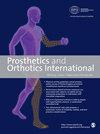脊柱稳定运动对经胫截肢者功能锻炼能力的影响:随机试验
IF 0.8
4区 医学
Q4 ORTHOPEDICS
引用次数: 0
摘要
背景:研究人员建议经胫骨截肢患者通过脊柱稳定练习优化活动能力,并减轻脊柱负荷;然而,脊柱稳定练习对功能锻炼能力的影响尚未得到研究。研究目的本研究旨在探讨脊柱稳定运动对经胫截肢者功能锻炼能力的影响。研究设计:随机对照试验,暗分配,评估者盲法。研究方法纳入 18 名经胫截肢患者。对照组患者接受常规物理治疗,干预组患者在接受常规物理治疗的同时接受为期8周的脊柱稳定运动训练。主要研究结果为 6 分钟阶梯测试中的最大摄氧量。次要结果包括:最大能量消耗、6分钟阶梯测试中的步数和疲劳度、佩戴假肢后的感知活动度以及脊柱深层肌肉的稳定力量。结果在组内比较中,两组的功能锻炼能力、步数和脊柱深部肌肉稳定力量的变化均有统计学意义。在组间比较中,功能锻炼能力、感知活动度和脊柱深层肌肉稳定力量的变化均有显著性,而脊柱稳定运动组更有显著性。结论是随着近端运动控制能力的提高,一些反映身体能力的参数也得到了改善。考虑到上述发展情况,在临床实践中,针对截肢者的以脊柱稳定为重点的锻炼计划正成为一种重要的选择。本文章由计算机程序翻译,如有差异,请以英文原文为准。
The effects of spinal stabilization exercises on functional exercise capacity in individuals with transtibial amputation: A randomized trial
Background: Optimization of mobility activities with spinal stabilization exercises and reducing spinal loads in individuals with transtibial amputation are recommended by researchers; however, the effect of spinal stabilization exercises on functional exercise capacity has not been investigated. Objective: This study aims to investigate the effect of spinal stabilisation exercises on functional exercise capacity in individuals with transtibial amputation. Study Design: Randomized controlled trial with concealed allocation, assessor blinding. Methods: Eighteen individuals with transtibial amputation were included. Conventional physiotherapy program was applied to individuals in control group, and spinal stabilization exercise training was applied to individuals in intervention group together with conventional physiotherapy program for 8 weeks. The primary outcome was maximal oxygen uptake during 6-Minute Stepper Test. The secondary outcomes were maximal energy expenditure, step count and fatigue during 6-Minute Stepper Test, perceived mobility level with prosthesis, and stabilization strength of deep spinal muscles. Results: In the within-group comparisons, the change in the functional exercise capacity, step count, and stabilization strength of deep spinal muscles were found to be statistically significant in both groups. In the between-group comparison, the changes in the functional exercise capacity, perceived mobility level, and stabilization strength of deep spinal muscles were found to be significant in favor of the group in which spinal stabilization exercises were applied. Conclusions: Along with improvement in proximal control of movement, improvements were observed in some parameters that are indicative of physical capacity. Considering the described developments, exercise programs focused on spinal stabilization in individuals with amputation are becoming a serious alternative in clinical practice.
求助全文
通过发布文献求助,成功后即可免费获取论文全文。
去求助
来源期刊
CiteScore
2.30
自引率
13.30%
发文量
208
审稿时长
6-12 weeks
期刊介绍:
Prosthetics and Orthotics International is an international, multidisciplinary journal for all professionals who have an interest in the medical, clinical, rehabilitation, technical, educational and research aspects of prosthetics, orthotics and rehabilitation engineering, as well as their related topics.

 求助内容:
求助内容: 应助结果提醒方式:
应助结果提醒方式:


